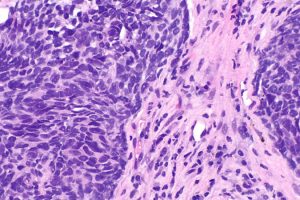Diabetes May Short Circuit Pembrolizumab Benefits in NSCLC

TOPLINE:
Pembrolizumab doesn’t work as well for patients with metastatic non–small cell lung cancer (NSCLC) who have diabetes.
METHODOLOGY:
-
Investigators reviewed the medical records of 203 consecutive patients with metastatic NSCLC who received first-line pembrolizumab either alone or in combination with chemotherapy at a single tertiary center in Israel.
-
Overall, 1 in 4 patients (n = 51) had diabetes mellitus; most (n = 42) were being treated with oral hypoglycemic agents, frequently metformin, and seven were taking insulin.
-
Rates of tumors with PD‐L1 expression above 50% were not significantly different among patients with diabetes and those without.
TAKEAWAY:
-
Overall, among patients with diabetes, median progression-free survival (PFS) was significantly shorter than among patients without diabetes (5.9 vs 7.1 months), as was overall survival (12 vs 21 months).
-
Shorter overall survival was more pronounced among those with diabetes who received pembrolizumab alone (12 vs 27 months) in comparison with patients who received pembrolizumab plus chemotherapy (14.3 vs 19.4 months).
-
After adjusting for potential confounders, multivariate analysis confirmed that diabetes was an independent risk factor for shorter PFS (hazard ratio [HR], 1.67) and shorter overall survival (HR, 1.73) for patients with NSCLC.
-
In a validation cohort of 452 patients with metastatic NSCLC, only 19.6% of those with diabetes continued to take pembrolizumab at 12 months, vs 31.7% of those without diabetes.
IN PRACTICE:
“As NSCLC patients with [diabetes] constitute a significant subgroup, there is an urgent need to validate our findings and explore whether outcomes in these patients can be improved by better glycemic control,” the authors say, adding that “chemotherapy may offset some of the deleterious effects” of diabetes.
SOURCE:
The study was led by Yasmin Leshem, MD, PhD, of the Tel Aviv Sourasky Medical Center, and was published June 24 in Cancer.
LIMITATIONS:
-
Without access to blood test results outside the hospital, the researchers could not determine whether better glycemic control might have improved outcomes.
-
The incidence of type 1 or 2 diabetes was not well documented.
DISCLOSURES:
-
No funding source was reported.
-
Two investigators reported receiving consulting and/or other fees from BMS, Roche, Merck, Novartis, and Merck Sharp and Dohme.
M. Alexander Otto is a physician assistant with a master’s degree in medical science and a journalism degree from Newhouse. He is an award-winning medical journalist who worked for several major news outlets before joining Medscape. Alex is also an MIT Knight Science Journalism fellow. Email: [email protected].
For more from Medscape Oncology, join us on Twitter and Facebook.
Source: Read Full Article